
Hosanna-Tabor correctly characterized the ministerial exemption as a limitation on the merits of the employment discrimination claim. I repeatedly argued for this position before the Court entered the mix, including in this Essay, which was written and accepted for publication in October 2011 (before the Court discovered unanimity and thus was able to decide the case fairly quickly). But the Court's jurisdictionality footnote was entirely conclusory, failing to explain why the issue controls whether the plaintiff's allegations entitle him to relief rather than whether the court has power to hear the case.
It thus remains to unpack why the exemption is, in fact, a merits doctrine. First, doing so demonstrates the correctness of the conclusion in Hosanna-Tabor, putting to rest any normative dispute on the issue. Second, mischaracterization of the ministerial exemption resulted from the same category errors that plague characterization of other legal issues; this issue illustrates nicely the routine conflation of jurisdiction and merits and courts' failure to maintain clean lines between doctrines and underlying concepts. While the Court's conclusion that the exemption is merits-based might be enough to signal lower courts on future jurisdictionality issues, actual analysis and explanation may better enable them to understand and recognize the limits of what goes to jurisdiction and, inversely, the breadth of what goes to substantive merits.
Available at: http://works.bepress.com/howard_wasserman/64/
